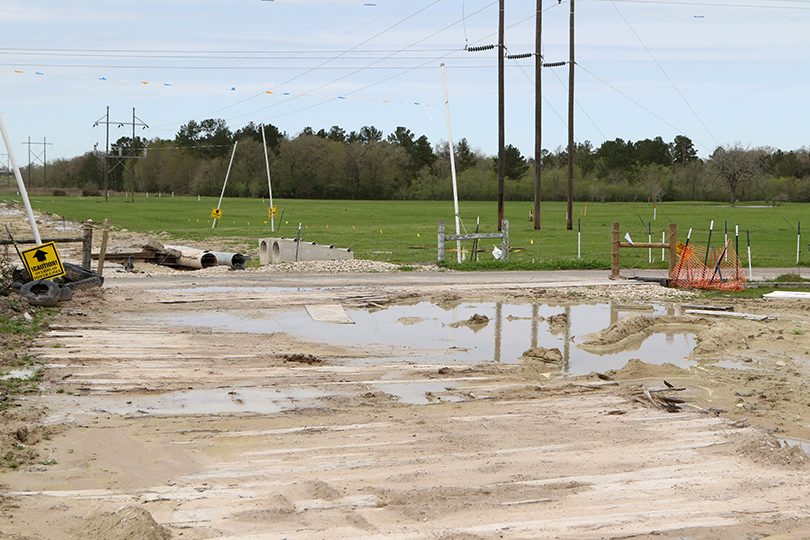By Jennifer Dorsett
Field Editor
Landowners received valuable information on negotiating fair eminent domain agreements in a recent webinar hosted by Texas Farm Bureau (TFB).
Eminent domain reform remains a priority issue for the organization, according to TFB President Russell Boening. He said as TFB awaits the upcoming Texas legislative session, the organization has ramped up educational efforts regarding eminent domain.
In lieu of planned in-person meetings across the state that were canceled due to the ongoing pandemic, the webinar Eminent Domain: Negotiating a Fair Deal sought to address some common questions and experiences landowners may have when faced with eminent domain proceedings.
“It’s well-known in Texas that property owners struggle with a lack of balance in our state’s eminent domain laws and in the takings process. Across the state, there can be widespread frustration and dissatisfaction with the status quo,” Boening said. “We at Texas Farm Bureau continue to push each legislative session for some common-sense reforms ensuring more fair, more transparent process with some built-in property right protections for us as landowners. But after the eminent domain reform legislation failed to pass in our last session, Texas Farm Bureau decided that landowners needed some help, and we needed it now.”
During the webinar, participants heard insights from attorney Jim Spivey and Texas A&M AgriLife Extension Service Agricultural Law Specialist Tiffany Dowell Lashmet. Participants also received details on several helpful resources on eminent domain from TFB’s government affairs staff.
When negotiating a fair deal, Spivey reminded landowners that even though eminent domain authority ultimately means that entity is going to take or use the land, that doesn’t mean the landowner should receive unfair or low compensation.
“The thing to realize is, in the condemnation context, this is a forced sale. A landowner is not in an equal bargaining system because in most situations, if you don’t think you have a fair deal, you say no, and both sides part ways. But in the condemnation context, you don’t get to say no. They’re going to condemn your property,” Spivey said. “And so the issue of fairness is oftentimes the issue of getting the most money that they’ll pay or getting the most money from a decision-maker. But the standard is, when your property is being taken, you’re entitled to just and adequate compensation. That’s the constitutional protection when somebody exercises exhaustive power of eminent domain.”
He discussed various issues that often arise in eminent domain agreements, including easement terms, damages to the remainder or main portion of a property not included in the easement, obtaining fair appraisals for just compensation and defining the highest and best use of land.
The initial agreement offered to landowners by an entity using eminent domain is often inadequate, Spivey said. He suggested landowners to negotiate for key terms and provisions like those detailed in TFB’s landowner handbook. Spivey also recommended landowners have a lawyer review any agreement carefully before the landowner signs anything, especially any warranty provisions made.
“It’s very important to have somebody read the ultimate document before you sign it to make sure that document accomplishes what you believe that you’ve negotiated for,” he said. “It is a critical point, because you don’t want to be involved in any lawsuit involving allegations of document ambiguities. Those can be very expensive litigation with a lot of uncertainty involved.”
Spivey also discussed the process of condemnation and what landowners can expect when taken to a special commissioner’s court when their land is condemned.
“In a condemnation matter in Texas, there’s an administrative phase to the case, and then there’s what I would call the regular lawsuit. So, before a condemning authority can even file a petition in condemnation, it has to do several things,” he said. “It has to send in what’s called an initial statutory offer letter, in writing to the landowner, offering to pay for what they’re seeking to acquire and it must provide the landowner with the Landowner Bill of Rights. After that initial offer letter is sent, the condemning authority has to wait at least 30 days before they provide you with a final written offer.”
Although many landowners feel intimidated and panic when presented with a condemnation lawsuit, he urged caution and reminded participants to seek the advice of an attorney before completing a deal.
“Over the years, there have probably been many landowners that settled condemnation matters when they received a petition condemnation, because nobody wants to get sued. It can cause a lot of stress,” Spivey said. “Remember, they’re condemning your property. You’re entitled to be paid. How much? That can be an issue of dispute, but you’re entitled to be paid for what has been taken.”
The webinar concluded with a question-and-answer session with Lashmet and Spivey, along with an update from Boening on TFB’s plans for eminent domain reform in the upcoming legislative session.
“It’s unfortunate that our laws don’t provide some of the guarantees that landowners need to receive. Our current law is hollow when it comes to landowner protections or the substance to force entities to negotiate in good faith,” Boening said. “But thankfully Rep. DeWayne Burns and Sen. Lois Kolkhorst, who have been our champions in the past, remain devoted to the legislation that we negotiated throughout the last session. Moving into 2020, we know that the pandemic has created some unprecedented and unpredictable circumstances for how legislation will advance in the future at the Capitol. But regardless of that, we remain steadfast, and we’re thankful that our bill authors feel the same way.”
To view a recording of the webinar, click here.
For more information and helpful resources on landowner rights, visit TFB’s eminent domain webpage.

